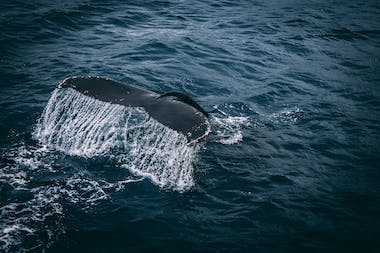The oceans have reached their highest recorded temperature, which is a cause for concern for the health of our planet. According to the EU’s climate change service Copernicus, the average daily global sea surface temperature surpassed the previous record set in 2016. This increase in temperature has dire implications for the Earth’s climate and ecosystems.
Oceans play a crucial role in regulating the climate. They absorb heat, produce oxygen, and drive weather patterns. However, warmer waters have a reduced capacity to absorb carbon dioxide, leading to increased levels of this planet-warming gas in the atmosphere. Additionally, hotter oceans can accelerate the melting of glaciers, resulting in rising sea levels.
The impact of hotter oceans and heatwaves extends to marine species. Fish and whales are forced to migrate in search of cooler waters, disrupting the food chain. Experts warn that fish stocks could be affected, and some predatory animals, such as sharks, may become more aggressive in hotter temperatures. Coral reefs are also at risk, with widespread coral bleaching and death already occurring in shallow reefs in Florida.
The current record-breaking ocean temperature is a cause for concern due to its timing. March is typically the warmest month for oceans globally, not August. This raises concerns about how much warmer the oceans may become in the coming months. Scientists attribute the increase in ocean temperatures to climate change, as the oceans absorb most of the heat from greenhouse gas emissions.
The new temperature record surpasses the previous one set in 2016 during the El Niño climate fluctuation. Another El Niño event has started, but it is currently weak. However, scientists predict that ocean temperatures will continue to rise above average in the coming months. This year has already seen a series of marine heatwaves in various locations, including the UK, the North Atlantic, the Mediterranean, and the Gulf of Mexico.
While air temperatures have seen significant increases in recent years, the oceans take longer to heat up. However, there are indications that ocean temperatures are now catching up. One theory suggests that much of the heat has been stored in the depths of the ocean and is now rising to the surface, possibly linked to El Niño.
Scientists are still investigating the exact reasons for the surge in ocean temperatures. While the warming of the sea surface due to greenhouse gas emissions has been anticipated, the extent of the increase seen in recent years is still being studied.
Original news source: Ocean heat record broken, with grim implications for the planet (BBC)
Listen
Slow
Normal
Fast
Group or Classroom Activities
Warm-up Activities:
– News Summary
Instructions: Divide the class into pairs or small groups. Give each group a few minutes to read the article. Then, ask them to summarize the main points of the article in a short news summary. They should include the key information, such as the highest recorded ocean temperature, the implications for climate and ecosystems, and the factors contributing to the increase in temperature. Afterward, have each group share their summary with the class.
– Opinion Poll
Instructions: Have the class form pairs or small groups. Ask them to discuss and share their opinions on the following question: “What do you think are the most concerning implications of the highest recorded ocean temperatures?” Afterward, conduct an opinion poll by having each group share their main points and opinions with the class. Encourage a class discussion by asking follow-up questions and facilitating a debate on the topic.
– Word Association
Instructions: Write the words “ocean temperature” on the board. Ask the class to brainstorm and write down as many words or phrases as they can think of that are related to this topic. Encourage them to think of various aspects, such as climate change, marine life, ecosystems, and human impact. After a few minutes, have each student or group share their word associations and explain the connections they made.
– Sketch It
Instructions: Provide each student with a blank piece of paper and a pen or pencil. Ask them to sketch a visual representation of the highest recorded ocean temperatures and its implications. They can include symbols, images, or diagrams to illustrate their ideas. Afterward, have each student share their sketch with a partner or small group. Encourage them to explain their artwork and engage in a discussion about the topic.
– Future Predictions
Instructions: Divide the class into pairs or small groups. Ask them to discuss and make predictions about the future impacts of rising ocean temperatures. They should consider various aspects, such as climate change effects, ecosystem disruptions, and human adaptation. After a few minutes, have each group share their predictions with the class. Encourage them to provide reasons and evidence to support their predictions.
Comprehension Questions:
1. What role do oceans play in regulating the climate?
2. How does warmer water affect the capacity of oceans to absorb carbon dioxide?
3. What are the implications of hotter oceans for marine species?
4. What is the significance of the timing of the current record-breaking ocean temperature?
5. What is the main cause of the increase in ocean temperatures?
6. How does the current ocean temperature record compare to the previous one set in 2016?
7. What locations have experienced marine heatwaves this year?
8. Why are scientists still investigating the surge in ocean temperatures?
Go to answers ⇩
Listen and Fill in the Gaps:
The oceans have reached their highest (1)______ed (2)______, which is a cause for concern for the health of our planet. According to the EU’s climate change service Copernicus, the average daily global sea surface temperature surpassed the previous record set in 2016. This increase in temperature has dire implications for the Earth’s climate and (3)______.
Oceans play a (4)______ role in regulating the climate. They absorb heat, produce oxygen, and drive weather patterns. However, warmer waters have a reduced capacity to absorb carbon dioxide, leading to increased levels of this planet-warming gas in the atmosphere. Additionally, hotter (5)______ can accelerate the melting of glaciers, resulting in rising sea levels.
The impact of hotter oceans and heatwaves extends to marine (6)______. Fish and whales are forced to migrate in search of cooler waters, disrupting the food (7)______. Experts warn that fish stocks could be affected, and some predatory animals, such as sharks, may become more aggressive in hotter temperatures. Coral reefs are also at risk, with widespread coral bleaching and death already occurring in shallow reefs in Florida.
The current record-breaking ocean temperature is a cause for concern due to its timing. March is typically the warmest (8)______ for oceans globally, not August. This raises concerns about how much warmer the oceans may (9)______ in the coming months. Scientists attribute the increase in ocean temperatures to climate change, as the oceans (10)______ most of the heat from greenhouse gas (11)______.
The new temperature record surpasses the previous one set in 2016 during the El Niño climate fluctuation. Another El Niño event has (12)______, but it is currently weak. However, scientists predict that ocean temperatures will continue to rise above average in the coming months. This year has already seen a series of marine heatwaves in various locations, including the UK, the North Atlantic, the (13)______, and the Gulf of (14)______.
While air temperatures have seen significant increases in (15)______ years, the oceans take longer to heat up. However, there are (16)______ that ocean temperatures are now catching up. One theory suggests that much of the heat has been stored in the depths of the ocean and is now rising to the surface, possibly linked to El Niño.
Scientists are still investigating the exact reasons for the surge in ocean temperatures. While the warming of the sea surface due to greenhouse gas emissions has been anticipated, the extent of the increase seen in recent years is still being studied.
Go to answers ⇩
Discussion Questions:
Students can ask a partner these questions, or discuss them as a group.
1. What is the role of oceans in regulating the climate? Why is this important?
2. How would you feel if fish stocks were significantly affected by hotter oceans? Why?
3. Do you think the increase in ocean temperatures will have a long-term impact on the Earth’s ecosystems? Why or why not?
4. What is coral bleaching? Why is it a concern for the health of coral reefs?
5. How do you think hotter oceans could affect the migration patterns of marine species? Why?
6. Do you think the increase in ocean temperatures is solely caused by climate change? Why or why not?
7. What are some potential consequences of rising sea levels? How might this affect coastal communities?
8. How do you think the increase in ocean temperatures could impact weather patterns? Why?
9. What do you think can be done to mitigate the effects of hotter oceans on marine ecosystems? Why?
10. How do you think the increase in ocean temperatures could impact the fishing industry? Why?
11. What is El Niño? How does it contribute to fluctuations in ocean temperatures?
12. How do you think marine heatwaves could impact marine life? Why?
13. What do you think can be done to reduce greenhouse gas emissions and slow down the increase in ocean temperatures? Why?
14. How do you think the increase in ocean temperatures could impact coastal tourism? Why?
15. Do you think the surge in ocean temperatures is a cause for immediate concern? Why or why not?
Individual Activities
Vocabulary Meanings:
Match each word to its meaning.
Words:
1. oceans
2. temperature
3. climate
4. heat
5. species
6. record
7. El Niño
8. greenhouse gas
Meanings:
(a) Different types of living organisms
(b) The long-term weather patterns of a region
(c) The transfer of thermal energy between objects
(d) Bodies of saltwater covering most of the Earth’s surface
(e) A climate pattern characterized by warm ocean temperatures
(f) The highest or best achievement or performance
(g) Gases that trap heat in the Earth’s atmosphere
(h) The measurement of the degree of hotness or coldness
Go to answers ⇩
Multiple Choice Questions:
1. According to the EU’s climate change service Copernicus, the average daily global sea surface temperature has:
(a) Decreased since 2016
(b) Stayed the same since 2016
(c) Surpassed the previous record set in 2016
(d) Not been recorded accurately
2. Warmer waters have a reduced capacity to absorb which gas?
(a) Oxygen
(b) Nitrogen
(c) Methane
(d) Carbon dioxide
3. Hotter oceans can accelerate the melting of:
(a) Volcanoes
(b) Glaciers
(c) Forests
(d) Deserts
4. What impact does hotter oceans and heatwaves have on marine species?
(a) Increased reproduction rates
(b) Decreased food consumption
(c) No impact on marine species
(d) Forced migration in search of cooler waters
5. What is a potential consequence of rising ocean temperatures for fish stocks?
(a) They could be affected
(b) They will thrive
(c) They will decline naturally
(d) They will become extinct
6. Coral reefs are at risk due to:
(a) Increased coral growth
(b) Decreased ocean acidity
(c) Coral bleaching and death
(d) Predatory animals
7. Which is typically the warmest month for oceans globally?
(a) June
(b) March
(c) December
(d) August
8. Ocean temperatures are catching up to air temperatures due to:
(a) Heat stored in the depths of the ocean rising to the surface
(b) Decreased greenhouse gas emissions
(c) El Niño events
(d) Increased cloud cover
Go to answers ⇩
True or False Questions:
1. The increase in ocean temperature does not have dire implications for the Earth’s climate and ecosystems.
2. The oceans have reached their highest recorded temperature.
3. Ocean temperatures are not catching up to air temperatures due to the heat stored in the depths of the ocean.
4. The increase in ocean temperatures is not attributed to climate change and greenhouse gas emissions.
5. Warmer waters have a reduced capacity to absorb carbon dioxide.
6. Coral reefs are at risk, with widespread coral bleaching and death already occurring.
7. Hotter oceans can accelerate the melting of glaciers and result in rising sea levels.
8. Fish and whales are not forced to migrate in search of cooler waters due to hotter oceans and heatwaves.
Go to answers ⇩
Write a Summary:
Write a summary of this news article in two sentences.
Check your writing now with the best free AI for English writing!
Writing Questions:
Answer the following questions. Write as much as you can for each answer.
Check your answers with our free English writing assistant!
1. What are the implications of warmer oceans on the Earth’s climate and ecosystems?
2. How do hotter oceans affect marine species and the food chain?
3. Why is the current record-breaking ocean temperature in March a cause for concern?
4. What is the relationship between ocean temperatures and greenhouse gas emissions?
5. What are scientists still investigating regarding the surge in ocean temperatures?
Answers
Comprehension Question Answers:
1. What role do oceans play in regulating the climate?
Oceans play a crucial role in regulating the climate. They absorb heat, produce oxygen, and drive weather patterns.
2. How does warmer water affect the capacity of oceans to absorb carbon dioxide?
Warmer waters have a reduced capacity to absorb carbon dioxide, leading to increased levels of this planet-warming gas in the atmosphere.
3. What are the implications of hotter oceans for marine species?
Hotter oceans force marine species to migrate in search of cooler waters, disrupting the food chain. Fish stocks could be affected, and some predatory animals, such as sharks, may become more aggressive in hotter temperatures. Coral reefs are also at risk, with widespread coral bleaching and death already occurring.
4. What is the significance of the timing of the current record-breaking ocean temperature?
The current record-breaking ocean temperature is significant because it occurred in March, which is typically the warmest month for oceans globally. This raises concerns about how much warmer the oceans may become in the coming months.
5. What is the main cause of the increase in ocean temperatures?
The main cause of the increase in ocean temperatures is climate change, as the oceans absorb most of the heat from greenhouse gas emissions.
6. How does the current ocean temperature record compare to the previous one set in 2016?
The current ocean temperature record surpassed the previous one set in 2016.
7. What locations have experienced marine heatwaves this year?
This year, marine heatwaves have been experienced in various locations, including the UK, the North Atlantic, the Mediterranean, and the Gulf of Mexico.
8. Why are scientists still investigating the surge in ocean temperatures?
Scientists are still investigating the surge in ocean temperatures to understand the exact reasons behind it. While the warming of the sea surface due to greenhouse gas emissions has been anticipated, the extent of the increase seen in recent years is still being studied.
Go back to questions ⇧
Listen and Fill in the Gaps Answers:
(1) record
(2) temperature
(3) ecosystems
(4) crucial
(5) oceans
(6) species
(7) chain
(8) month
(9) become
(10) absorb
(11) emissions
(12) started
(13) Mediterranean
(14) Mexico
(15) recent
(16) indications
Go back to questions ⇧
Vocabulary Meanings Answers:
1. oceans
Answer: (d) Bodies of saltwater covering most of the Earth’s surface
2. temperature
Answer: (h) The measurement of the degree of hotness or coldness
3. climate
Answer: (b) The long-term weather patterns of a region
4. heat
Answer: (c) The transfer of thermal energy between objects
5. species
Answer: (a) Different types of living organisms
6. record
Answer: (f) The highest or best achievement or performance
7. El Niño
Answer: (e) A climate pattern characterized by warm ocean temperatures
8. greenhouse gas
Answer: (g) Gases that trap heat in the Earth’s atmosphere
Go back to questions ⇧
Multiple Choice Answers:
1. According to the EU’s climate change service Copernicus, the average daily global sea surface temperature has:
Answer: (c) Surpassed the previous record set in 2016
2. Warmer waters have a reduced capacity to absorb which gas?
Answer: (d) Carbon dioxide
3. Hotter oceans can accelerate the melting of:
Answer: (b) Glaciers
4. What impact does hotter oceans and heatwaves have on marine species?
Answer: (d) Forced migration in search of cooler waters
5. What is a potential consequence of rising ocean temperatures for fish stocks?
Answer: (a) They could be affected
6. Coral reefs are at risk due to:
Answer: (c) Coral bleaching and death
7. Which is typically the warmest month for oceans globally?
Answer: (b) March
8. Ocean temperatures are catching up to air temperatures due to:
Answer: (a) Heat stored in the depths of the ocean rising to the surface
Go back to questions ⇧
True or False Answers:
1. The increase in ocean temperature does not have dire implications for the Earth’s climate and ecosystems. (Answer: False)
2. The oceans have reached their highest recorded temperature. (Answer: True)
3. Ocean temperatures are not catching up to air temperatures due to the heat stored in the depths of the ocean. (Answer: False)
4. The increase in ocean temperatures is not attributed to climate change and greenhouse gas emissions. (Answer: False)
5. Warmer waters have a reduced capacity to absorb carbon dioxide. (Answer: True)
6. Coral reefs are at risk, with widespread coral bleaching and death already occurring. (Answer: True)
7. Hotter oceans can accelerate the melting of glaciers and result in rising sea levels. (Answer: True)
8. Fish and whales are not forced to migrate in search of cooler waters due to hotter oceans and heatwaves. (Answer: False)
Go back to questions ⇧















